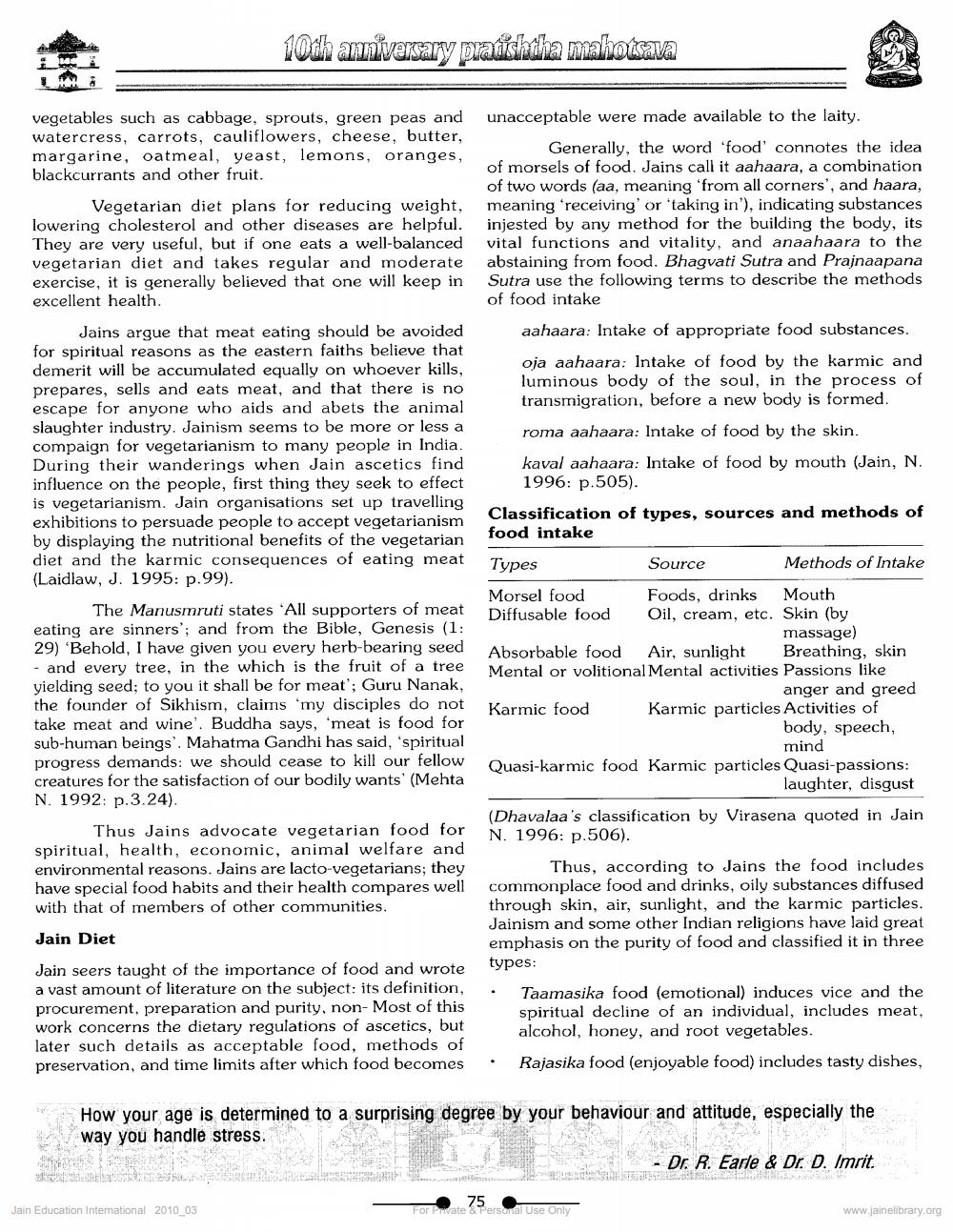________________
10th anniversary pradzhoka mahotsava
vegetables such as cabbage, sprouts, green peas and watercress, carrots, cauliflowers, cheese, butter, margarine, oatmeal, yeast, lemons, oranges, blackcurrants and other fruit.
Vegetarian diet plans for reducing weight, lowering cholesterol and other diseases are helpful. They are very useful, but if one eats a well-balanced vegetarian diet and takes regular and moderate exercise, it is generally believed that one will keep in excellent health.
Jains argue that meat eating should be avoided for spiritual reasons as the eastern faiths believe that demerit will be accumulated equally on whoever kills, prepares, sells and eats meat, and that there is no escape for anyone who aids and abets the animal slaughter industry. Jainism seems to be more or less a compaign for vegetarianism to many people in India. During their wanderings when Jain ascetics find influence on the people, first thing they seek to effect is vegetarianism. Jain organisations set up travelling exhibitions to persuade people to accept vegetarianism by displaying the nutritional benefits of the vegetarian diet and the karmic consequences of eating meat (Laidlaw, J. 1995: p.99).
The Manusmruti states 'All supporters of meat eating are sinners'; and from the Bible, Genesis (1: 29) 'Behold, I have given you every herb-bearing seed - and every tree, in the which is the fruit of a tree yielding seed; to you it shall be for meat'; Guru Nanak, the founder of Sikhism, claims 'my disciples do not take meat and wine'. Buddha says, 'meat is food for sub-human beings'. Mahatma Gandhi has said, 'spiritual progress demands: we should cease to kill our fellow creatures for the satisfaction of our bodily wants' (Mehta N. 1992: p.3.24).
Thus Jains advocate vegetarian food for spiritual, health, economic, animal welfare and environmental reasons. Jains are lacto-vegetarians; they have special food habits and their health compares well with that of members of other communities.
Jain Diet
Jain seers taught of the importance of food and wrote a vast amount of literature on the subject: its definition, procurement, preparation and purity, non- Most of this work concerns the dietary regulations of ascetics, but later such details as acceptable food, methods of preservation, and time limits after which food becomes
Jain Education International 2010_03
unacceptable were made available to the laity.
Generally, the word 'food' connotes the idea of morsels of food. Jains call it aahaara, a combination of two words (aa, meaning 'from all corners', and haara, meaning 'receiving' or 'taking in'), indicating substances injested by any method for the building the body, its vital functions and vitality, and anaahaara to the abstaining from food. Bhagvati Sutra and Prajnaapana Sutra use the following terms to describe the methods of food intake
aahaara: Intake of appropriate food substances.
oja aahaara: Intake of food by the karmic and luminous body of the soul, in the process of transmigration, before a new body is formed.
roma aahaara: Intake of food by the skin.
kaval aahaara: Intake of food by mouth (Jain, N. 1996: p.505).
Classification of types, sources and methods of food intake
Types
Morsel food Diffusable food
Methods of Intake
Karmic food
Mouth Skin (by massage) Absorbable food Air, sunlight Breathing, skin Mental or volitional Mental activities Passions like anger and greed Karmic particles Activities of body, speech, mind Quasi-karmic food Karmic particles Quasi-passions: laughter, disgust (Dhavalaa's classification by Virasena quoted in Jain N. 1996: p.506).
Source
Foods, drinks Oil, cream, etc.
Thus, according to Jains the food includes commonplace food and drinks, oily substances diffused through skin, air, sunlight, and the karmic particles. Jainism and some other Indian religions have laid great emphasis on the purity of food and classified it in three types:
Taamasika food (emotional) induces vice and the spiritual decline of an individual, includes meat, alcohol, honey, and root vegetables.
Rajasika food (enjoyable food) includes tasty dishes,
How your age is determined to a surprising degree by your behaviour and attitude, especially the way you handle stress.
75
For Private & Personal Use Only
Dr. R. Earle & Dr. D. Imrit.
www.jainelibrary.org




